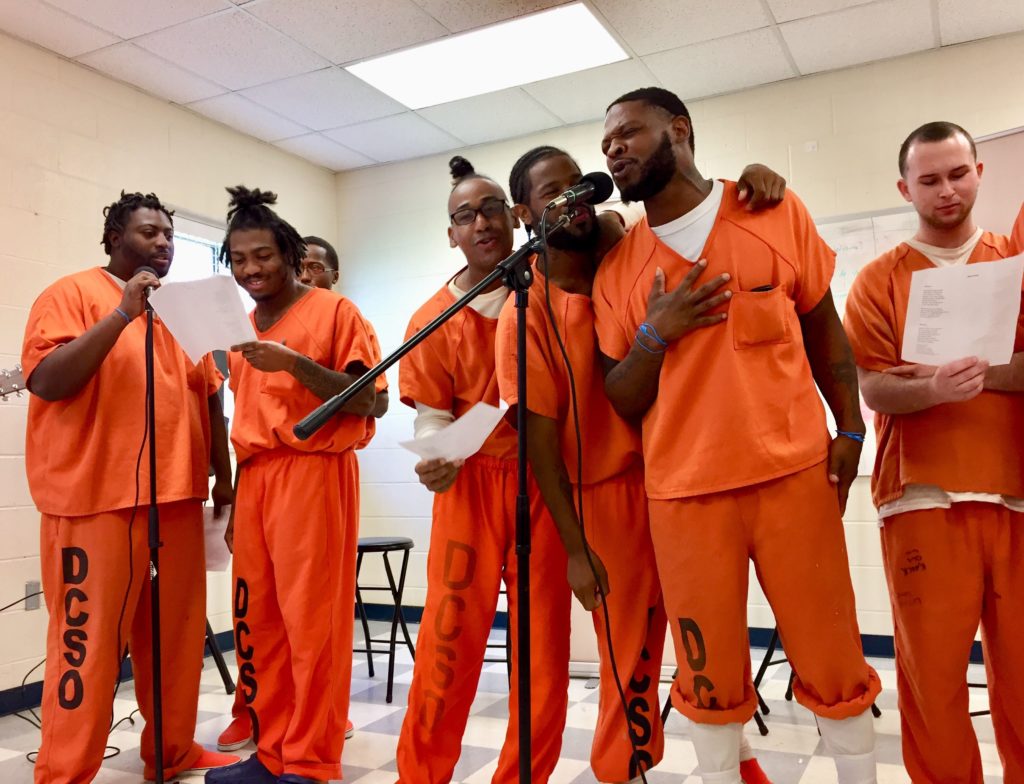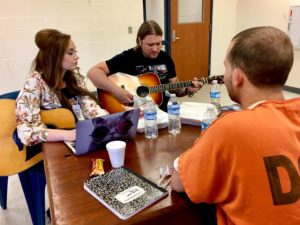
It’s a Tuesday morning in July, and Jacob Freudiger is sitting at an old wooden table, with a marbled notebook and pen at the ready. The 21-year-old, dressed in a matching orange V-neck and sweats with scribbles down the thigh, has never written a song before.
But across the table, in this stuffy room at the Davidson County Jail, two veteran songwriters have guitars in their laps, ready to turn his thoughts into music.
“So first, I like to hear people’s stories,” says songwriter Billy Dawson. “Whatever you want to share with us. You can share what you want to and don’t share what you don’t want to.”
He and the other musician in the room, Katie Cole, are Nashville-based songwriters who volunteer with The Beat of Life, an organization that aims to heal vulnerable populations through music.
In the group’s Redemption Songs workshop, inmates at the jail spend five weeks learning the basics of songwriting. Then a crew of musicians helps the participants translate their experiences into song.
Freudiger’s not used to talking about himself. He says he doesn’t know where to start. But then he leans forward.
“I guess I’ll start at the very beginning,” he says. “The time I was born to the age of four I was with my parents. But my dad went to prison and my mom got hooked on drugs real bad.”
Freudiger’s mother sent him and his siblings to live with their aunt. And that’s when he says he started getting into trouble.
 Samantha Max WPLN
Samantha Max WPLNDavidson County Jail inmate Jacob Freudiger flips through a notebook filled with lyrics and song ideas for a songwriting workshop at the jails. Freudiger says the program has helped him work through his drug addiction. He’s been clean five months.
“I was just in a real, real deep whole, real deep depression,” Freudiger says. “And I was trying to cope with that by hanging around with people. You know, trying to fit in where I really didn’t – where I didn’t really belong.”
At 13, Freudiger says he spent his first bout in juvenile detention, on drug and gun charges.
“I said that I would change right there and then. I didn’t want to be like my dad,” he says. “And then two years later I ended up in juvie again for the same thing. And then, that’s the last time I was locked up.”
Until now.
Freudiger has been in jail for five months. Before that, he’d landed a steady job moving furniture and says he was making good money.
But then Freudiger got shot in the leg and couldn’t work. He was struggling to pay his bills. And a friend said he had a plan to make money quick. So they robbed a gas station and a dollar store back-to-back.
When the police showed up at Freudiger’s front door and put him in handcuffs, he felt like he’d let down the one person who’d tried to steer him in the right direction.
“Oh, I forgot to tell you about that guy,” he says, the corner of his left lip lifting into a crooked smile. “That’s who I was missing. My grandpa.”
Then Freudiger points to a tattoo on his right tricep that pays tribute to his grandfather, who died from cancer a few years ago. Freudiger says his grandpa was a simple man, who warned him not to ruin his life after his second stint in juvenile detention.
As Cole types up notes on a laptop, Freudiger says he wishes he could be more like his Grandpa Sam.
 Samantha Max WPLN
Samantha Max WPLNNashville songwriters Katie Cole, left, and Billy Dawson, center, transform the words of Davidson County Jail inmate Jacob Freudiger, right, into a song at The Beat of Life Redemption Songs program July 30.
“I feel like that would be a wonderful thing to write about,” Cole says, eyeing her laptop screen. “When you were talking, I just wrote out some lyrics. Like, ‘I tried to fit in where I don’t belong. Said I would change, but I’m not as strong as you.'”
Cole says she wants the song to say all the things Freudiger wishes he could tell his grandfather. Then, she and Dawson start plucking the strings of their glossy guitars, humming melodies and testing out words.
Songwriting as therapy is not a new concept in Music City. Other programs work with veterans, sexual assault survivors, and those suffering from anxiety and depression.
But Mary Cohen, an associate professor of music education at the University of Iowa, says songwriting can be especially powerful for those behind bars.
“When bodies are pushed away from their home communities – they’re away from their families, their home culture – there is something that’s missing,” Cohen says. “And so, music-making, in some ways, can fulfill what’s missing.”
Cohen has spent almost two decades studying the impact of music in jails and prisons. She’s found that programs like songwriting classes and prison choirs can alleviate stress, improve self-esteem and inspire participants to seek out other educational opportunities while incarcerated.
 Samantha Max WPLN
Samantha Max WPLNFreudiger says faith and his grandfather’s memory have played a big role in his recovery while in jail. “I know he was trying to slow me down – him and God – and I just ignored it,” Freudiger says.
And, Cohen says, programs like The Beat of Life have an added bonus: It brings together people inside of jails with musicians from the outside, which can also help individuals with drastically different life experiences connect with one another.
“Music-making and listening to someone else’s voice expressed through original song is a bridge,” she says. “When you create that song, it’s this seed of an idea from one individual that is embodied now into a song that we hear with our bodies. And so, that bridge is – it’s powerful.”
Songwriter Kim McLean has volunteered with The Beat of Life for years and says it’s been easy for her to find common ground with the participants. She hopes songwriting will help participants “snap out of something that was hurting them,” just as it’s done for her.
“I hope that they will take away healing for their hurts, comfort for their souls,” she says. “And I hope that some of them take away an ability to write songs and to keep writing.”
After barely two hours together, Freudiger, Cole and Dawson sit side-by-side in the jail’s chapel, in front of an audience that’s half songwriters and half inmates. And for a moment, this sterile room surrounded by barbed wire doesn’t quite feel like a jail.
Freudiger says he feels like the songwriters lifted a weight off his shoulders. He’s never told his story before, let alone a group of strangers.
“So that’s my life story – a 21-year-old’s story – turned out into a two-minute, three-minute song,” Freudiger says. “So, it was pretty nice.”
Freudiger hopes to keep writing songs. Next, he wants to delve into his battle with addiction. He’s got a notebook full of ideas, just waiting to be put to music.
Samantha Max is a Report for America corps member.
9(mda2nzqwotg1mdeyotc4nzi2mzjmnmzlza001))

